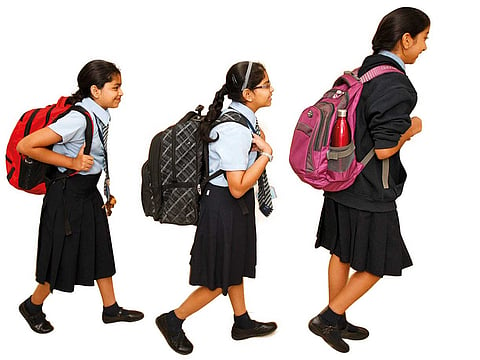Back to school: Winds of change in UAE
Most schools are set to open on September 10, with several changes and improvements lined up

Abu Dhabi/Dubai: The new school year is round the corner, with classes resuming on September 10 for the vast majority of UAE schools.
The fresh academic year will bring changes to the classroom and curricula; in studies and student life.
For the first time, teachers will begin registering for a UAE teacher’s licence, but only after passing a series of evaluations.
Eventually, by 2021, all teachers will be required to have to have the licence.
Schools will also start implementing the new subject of Moral Education, whose content and way of teaching will vary from school to school.
The programme will break new ground in that it will not be confined to textbooks, classrooms or exams.
Instead, the subject will be grounded in five key elements — ethics, personal and community development, culture and heritage, civic education, and human rights and responsibilities.
There will also be new subjects specifically for schools following the Ministry of Education curriculum, in social studies, the UAE’s sustainability model, social media, and other topics.
These Arabic-medium schools will also welcome 500 English-speaking foreign teachers in the classroom for the first time. They will teach grades six to 12 in around 200 schools in Dubai and the Northern Emirates, in subjects such as creative design, sciences and others, all taught in English.
In Abu Dhabi, a total of 13 new schools are set to open their doors in the 2017-2018 academic year, including seven private and six public schools.
Barring any closures, this is expected to increase the total number of schools to 467.
Of the six new public schools, four are located in Al Ain while the other two are in the suburbs of the capital.
Two of the new private schools — Garden City British School and Al Takamul Private School — are also in Al Ain. Four others are in the suburbs, while one, the Repton School, is opening up an extension for senior students adjoining its campus on Reem Island.
Student numbers at private schools are usually expected to increase by about 5 per cent every year, up from 245,000 students across 199 institutions in the previous academic year.
On the other hand, public schools expect student numbers to grow by nearly 10 per cent in 2017-2018 from the 132,392 students enrolled in 255 schools last year (2016-2017).
Fee hike
As reported by Gulf News in June, this year will also see a 3 per cent fee hike at 24 private schools, according to officials at the emirate’s education sector regulatory body, the Abu Dhabi Education Council (Adec).
In Dubai, a landmark census will begin in November on the wellbeing of 70,000 students in middle school. This will provide insights into their school life, concerns and aspirations.
The UAE will also welcome around 10 new private schools in Dubai and seven in Abu Dhabi, offering British, Indian, IB, French, Canadian, American, and UAE curricula.
And beyond home-grown goals, UAE schools will also participate in international targets.
Last month, the newly-formed Emirati national committee for education, culture and science announced that more than a 100 schools will be assessed to determine their degree of commitment to Unesco Sustainable Development goals. The selected schools will be realigned, if needed, to meet those goals.
Education in the UAE, always a priority with the leadership and a major receiver of the national budget, is already paying dividends. Schools are moving up in international standardised test rankings and many students in the country regularly score in the top percentile of prestigious school-leaving exams such the A Levels and IB Diploma.
SCHOOL STATS
More than 1.1 million students in UAE
273,599 students in Dubai private schools in 2016/17 school year
185 private schools in Dubai, offering 16 national curriculums (10 new schools expected to open in 2017/18 cycle)
Dh6.8 billion was the annual tuition revenue of private schools in Dubai in 2016/17
57.5 per cent of students pay less than Dh20,000 per year in tuition fees


